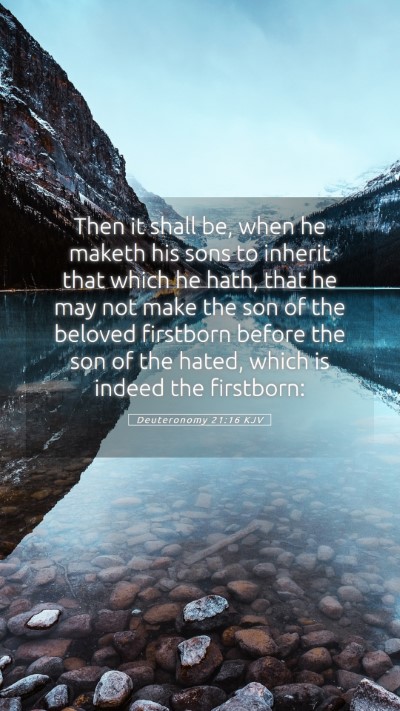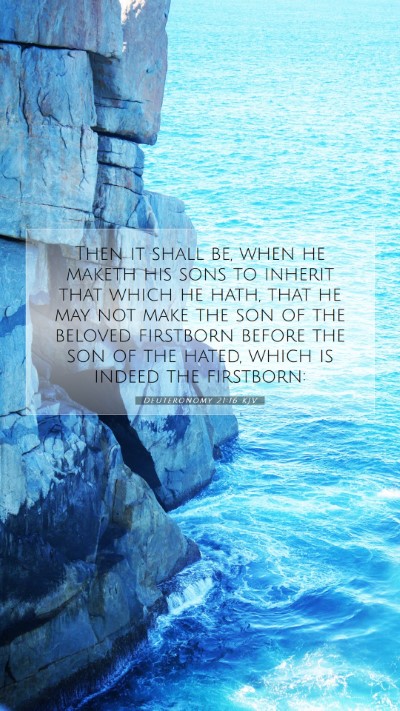Understanding Deuteronomy 21:16
Bible Verse: Deuteronomy 21:16
"If a man has two wives, one loved and the other unloved, and both the loved and the unloved have borne him children, and if the firstborn son belongs to the unloved, ..." (Deuteronomy 21:16, NIV)
Overview of the Verse
This verse is part of the Mosaic Law and addresses the rights of a firstborn son, particularly in the context of polygamous relationships. It emphasizes the importance of recognizing and honoring the firstborn, regardless of the circumstances surrounding his birth.
Insights from Biblical Commentaries
This analysis brings together insights from public domain commentaries, including those of Matthew Henry, Albert Barnes, and Adam Clarke, to provide a comprehensive understanding of this verse.
Matthew Henry's Commentary
Henry emphasizes the moral and just nature of inheritance laws in Israel. He discusses how the law aims to prevent the favoritism that can arise in polygamous households and insists that the firstborn son must receive a double portion of the inheritance. He illustrates the social implications of this law in maintaining order and fairness within families, particularly in contexts where love and favoritism may skew the natural rights of children.
Albert Barnes' Commentary
Barnes focuses on the historical context of Israel during the time of Moses. He notes that this provision served as a safeguard for the firstborn, ensuring that he receives his rightful inheritance despite which wife may be favored. Barnes also interprets this verse as reflective of God's broader principles of justice and order in human relationships, making the case that God recognizes human emotional complexities but seeks to provide fairness through divine law.
Adam Clarke's Commentary
Clarke takes a more integrative approach, examining the implications of having multiple wives in relation to the biblical tradition. He notes that this verse provides a reflection on the complexities of love and familial obligations. Clarke emphasizes that the law also serves to remind families of the weight of their responsibilities towards one another, encouraging love and preference not to override justice.
Key Themes and Lessons
- Fairness in Inheritance: This verse highlights the biblical principle that the firstborn son must receive his rightful share, reflecting the value placed on birth order.
- Complexities of Family Dynamics: The mention of two wives introduces the real-life challenges faced in polygamous families, showcasing human emotions of love and favoritism.
- God's Justice: The law serves as a testament to God's desire for justice, even amidst human complexities, and affirms the need for equitable treatment of all children.
Connecting with Broader Biblical Context
Deuteronomy 21:16 can be better understood when viewed alongside other biblical passages that discuss family, inheritance, and divine justice:
- Exodus 21:15-17: Laws regarding the treatment of children and the rights of the firstborn.
- Genesis 49:3: Jacob’s blessing of his firstborn, Reuben, underlining the importance of the birthright.
- Proverbs 13:22: A good man leaves an inheritance for his children’s children, emphasizing the biblical importance of planning for future generations.
Application to Modern Life
This scripture not only has historical significance but also offers lessons for modern believers regarding the importance of fairness, respect for family roles, and navigating complex relationships. Understanding such verses can be beneficial in Bible study groups, enhancing discussions on human relationships and divine instruction.
Conclusion
In summary, Deuteronomy 21:16 provides rich content for Bible study insights and understanding Scripture. It serves as a reminder of God's justice within human complexities and emphasizes the importance of adhering to divine law in our daily lives.
Explore Further
For those seeking deeper understanding, consider engaging in online Bible study platforms or utilizing Bible study tools to uncover more profound meanings and applications of biblical texts.


